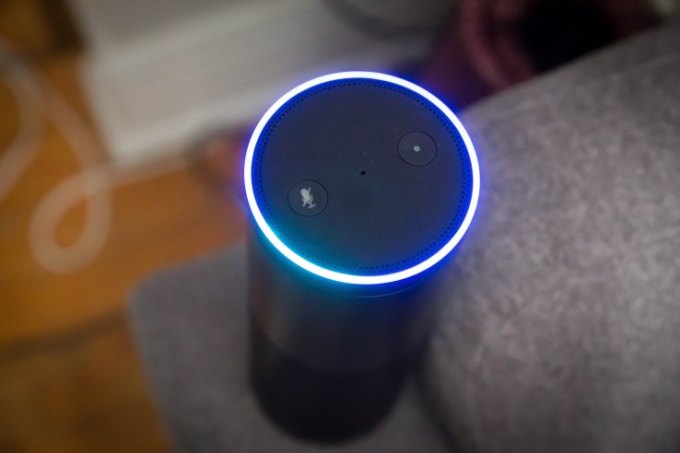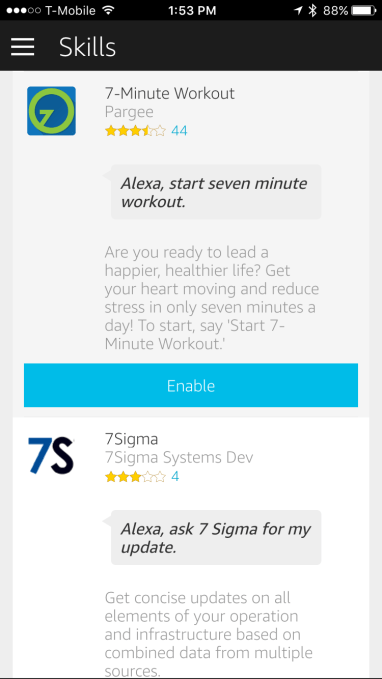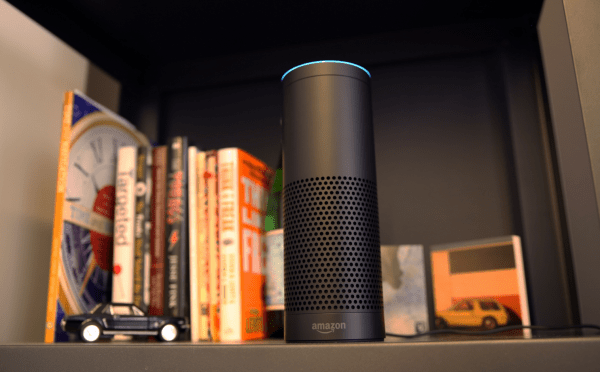Amazon has been quietly building out an ecosystem of applications for its connected device, the Amazon Echo. While nowhere near as well-known or buzzed about as the two top app stores on the market today – Apple’s iTunes App Store and Google’s Play Store – the Echo app store, aka the “Skills” section in the Amazon Alexa mobile app, has now grown to over 130 applications. That’s not a bad showing for the still relatively new, voice-controlled speaker, which only began rolling out its first third-party applications in August.
You may have not been aware that Amazon was even running a second app store, in addition to its better known Amazon Appstore where it offers a selection of mobile apps for Android and Amazon Fire devices. After all, the Alexa app doesn’t even refer to its list of third-party software as “apps”, rather referring to these add-ons as “skills” instead – meaning, things that expand the functionality of the Alexa-powered Echo speaker.
Alexa, in case you’re unaware, is Amazon’s own version of something like Apple’s Siri or Google Now. It’s a voice-activated assistant that lets you ask questions, create tasks and shopping lists, order things from Amazon, hear the news and weather, play music, set timers and alarms, and even control a number of “smart home” devices like lights and switches.

The first third-party applications debuted this summer for Echo, with StubHub being one of the bigger names to arrive, allowing you to ask Alexa about different activities taking place nearby.
Now the Echo’s app store has 135 of these additional “skills” available, at last count. A lot of these apps are really goofy – things your kids may like, such as a fart app (yes, you’re not an app store until you have one of these!), an insult app called Angry Bard, plus various joke applications and trivia games, like Cat Facts or Dog Facts. (These are not exactly high-quality applications, mind you.)
Our Amazon #Echo can now fart on command. pic.twitter.com/GkgLZslmLd
— Tony Summerville (@summerville) January 1, 2016
//platform.twitter.com/widgets.js
However, there is a growing number of more noteworthy – and practical – apps arriving on Echo as well.
This list includes things like the health-focused 7-Minute Workout app; a voice-powered TV remote from AnyMote; news and weather apps from bigger names like AccuWeather, AOL, HuffPost, oh, and TechCrunch (disclosure!); an app that reminds you where you’ve parked your car and how much gas you have left from Automatic; a recipe finder from Campbell’s; a bartender’s guide to mixing drinks; various apps to check local transit schedules; event guides from Bandsintown.com and the above-mentioned StubHub; stock quotes from Fidelity; a family locator from Glympse; a universal translator app; and even interactive games you play with Alexa like Word Master, Bingo, or Animal Game, for example.

The problem is that finding the better apps among the clutter is still a challenge, given that the Echo’s app store is fairly bare bones.
Today, there are no “category” sections or top lists, for instance. You have no way to tell what’s trending, popular, or recommended. Plus, it could be confusing to end users that app developers suggest using different “trigger” phrases to launch their apps. (In some cases, the developer says to tell Alexa to “open” the app. Other times, you tell Alexa to “ask” the app a question.) That could have people installing apps (i.e., the “skills”) but then forgetting how to launch them.
But there are signs that Amazon is working to turn Echo’s selection of miscellaneous add-ons into something that better resembles a “real” app store. Just before Christmas, for example, the company introduced support for standard app store features like a search engine and customer reviews that involve star ratings. That means it’s now easier to find apps to use with Echo, as well as see if other Echo owners liked the apps you’re interested in using.
Unfortunately, the implementation suffers a bit at present. A test to surface apps that we know exist using obvious keywords like “news,” “travel,” or “events,” returned only partial search results. In other words, Echo’s app store still has far to go.
Of course, none of the app store’s progress would matter except for the fact that Amazon’s Echo is becoming one of the more popular smart home devices on the market today. At a sub-$200 price point, the speaker has been praised as being impressive, accurate, natural to use, while offering a “Star Trek” computer-like experience for the home.
And while Amazon notoriously releases the vaguest sales figures for its devices, it’s telling that the Echo was the company’s top-selling device on Black Friday, across all devices over $100. Today, it continues to hold a top 5 spot in Amazon’s list of best-selling electronics devices. Plus, the speaker has a four-and-a-half star rating even as it nears 30,000 customer reviews.
For the simple reason that the Echo itself is finding its way into more customer homes, the importance of its add-on app store may also grow over time. The question for developers, however, is whether building Alexa apps will eventually be profitable enough to be worth the trouble. After all, today, Alexa’s skills are free add-ons. But as the ecosystem grows, Amazon could potentially offer the ability for developers to monetize their apps through paid downloads or – who knows? – voice-controlled purchases – in the future.
